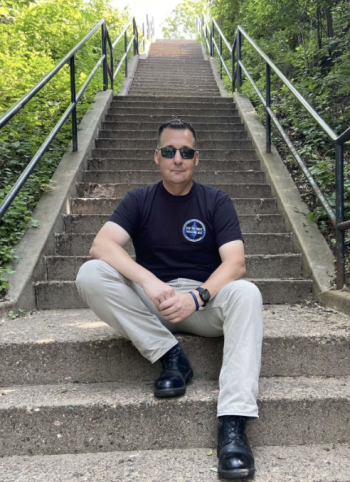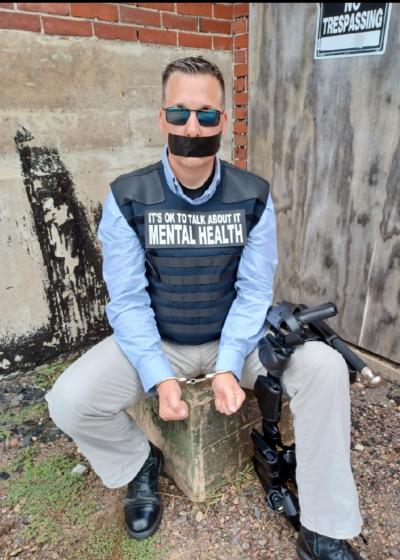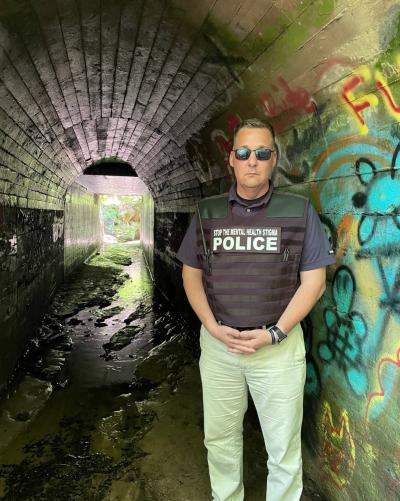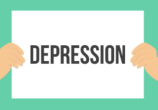A Police Officer's Poor Coping Strategies
 My name is Adam A. Meyers and I was a Police Officer in Wisconsin for 21 years. On Friday, April 8, 2016, at 5:15 p.m., I was involved in a critical incident when I used deadly force against someone who armed themselves with a hatchet inside a busy department store. This person died. I faced many personal and professional mental health challenges after my critical incident. I have been diagnosed with a mental illness, and it has taken me many years to get back on track. I continue to struggle, but I am better than I was.
My name is Adam A. Meyers and I was a Police Officer in Wisconsin for 21 years. On Friday, April 8, 2016, at 5:15 p.m., I was involved in a critical incident when I used deadly force against someone who armed themselves with a hatchet inside a busy department store. This person died. I faced many personal and professional mental health challenges after my critical incident. I have been diagnosed with a mental illness, and it has taken me many years to get back on track. I continue to struggle, but I am better than I was.
There are many different coping strategies people may use after experiencing trauma. They may be good and healthy, or they may be bad and unhealthy. My coping strategies were bad, unhealthy, self-destructive, and dangerous. I used alcohol, marijuana, casual sex, and self-harm as some of my poor coping strategies for years after my critical incident.
My poor coping strategies easily put my relationships, my job, and my health at risk, but I did not care. I wanted to escape from what I was feeling. I wanted to numb my emotions, my thoughts, my body, and any memory of taking someone’s life. I wanted to feel better even if only momentarily. I was selfish, reckless, and I did not care how my self-destructive and dangerous behavior may affect other people. I did not even care how my behavior affected my family, friends, co-workers, or the public.
One of my many poor coping strategies was abusing alcohol. Prior to my critical incident I collected wine and enjoyed a glass of wine every now and then. However, after my critical incident I began abusing liquor, mainly whiskey and the cheapest vodka I could get my hands on. I would consume whiskey and vodka straight from their bottles, on the rocks, or I would create my own cocktails by combining over the counter liquid sleeping or liquid allergy medicines. There were times that I would mix in whatever leftover prescription medicines I had in the medicine cabinet, and it did not matter if they were prescribed to me or someone else. A medication specially stated, “DO NOT DRINK ALCOHOLIC BEVERAGES WHILE TAKING THIS MEDICATION.” A warning label did not deter me from abusing alcohol. I very well could have blacked out and never woken up from consuming these dangerous cocktails, but at the time I did not care. I did not care and wanted an escape from my emotional pain. Abusing alcohol may have been a quick fix, but it caused me even more stress, anxiety, and depression.
 There were many times I did not want to go to work. This was not because I had other plans or that I was hungover from consuming too much alcohol, but I just wanted to stay at home and isolate myself from the world. I wanted to lock all the doors of my home, close all the curtains, and shut everyone out of my life. Sure, I called in sick from time to time, but on one occasion, I intentionally injured myself so that I did not have to work.
There were many times I did not want to go to work. This was not because I had other plans or that I was hungover from consuming too much alcohol, but I just wanted to stay at home and isolate myself from the world. I wanted to lock all the doors of my home, close all the curtains, and shut everyone out of my life. Sure, I called in sick from time to time, but on one occasion, I intentionally injured myself so that I did not have to work.
Another way I was able to get out of working was to intentionally make myself sick. I remember while taking a shower before my shift I was thinking about the many ways I could get out of working. While I was putting on my ballistic vest, uniform, boots, and duty belt, I thought to myself, “I’m going to get out of working by binge eating and making myself vomit.” I constructed a plan to visit the local Burger King drive-thru while traveling to work. I ordered a bunch of breakfast food and made sure I washed it down with a large soda and a large orange juice. I continued to travel to work after consuming a large amount of breakfast food from Burger King. I was about to pass the local McDonalds and thought to myself, “Two is better than one.” I decided to travel through the McDonalds drive-thru and order even more breakfast food and beverages. I quickly binged what I purchased and proceeded to work. I arrived at work and upon exiting my vehicle I played the role of the sick employee. I walked into the police department and made myself vomit in the bathroom. I made sure the bathroom door remained open so that anyone walking by could see or hear me. I was immediately sent home.
I dangerously coped by drinking and driving. Prior to attending any type of social event, even as simple as going to the grocery store, I would consume alcohol. I would rationalize that it would take about 30 minutes for me to feel the effects of the alcohol and by the time I was impaired I would have arrived at my destination. I was very fortunate that I was not arrested for drinking and driving or even worse, killing someone.
I used casual sex as a coping strategy and to distract myself from my emotional discomfort and pain. But this caused me more stress and anxiety than anything else. Sure, I felt great during sex, but it caused me more harm than good. Although this type of sexual behavior was risky, self-destructive, and caused me stress and anxiety, it was not enough to convince me to stop. I wanted an instant feel-good escape from my life and casual sex provided that for me.
 I suffered in silence for many years after my critical incident and I am ashamed for the ways I poorly coped. I find it hard to believe that nobody realized or even had a gut feeling that I was not doing well. I could not have been that good at hiding my poor coping strategies, or was I? I have always wondered if people were slowly watching me self-destruct because they did not know what to say to me, how to help me, or they simply did not want to get involved.
I suffered in silence for many years after my critical incident and I am ashamed for the ways I poorly coped. I find it hard to believe that nobody realized or even had a gut feeling that I was not doing well. I could not have been that good at hiding my poor coping strategies, or was I? I have always wondered if people were slowly watching me self-destruct because they did not know what to say to me, how to help me, or they simply did not want to get involved.
Please reach out to someone if you believe they are struggling with their mental health. I know it may feel awkward or uncomfortable, but most people will not admit they are struggling, and most people will not reach out for help. You could be a light during a very dark time in their life.
Good coping strategies I do now are eating healthy, walking, hiking, kayaking, being out in nature, spending quality time with family and friends, and sharing my experience with others. I'm currently a Mental Health Crisis Worker in Southeastern Wisconsin. My employer, supervisor, and co-workers are very supportive.
Early 2022, I was finally undergoing treatment that helped me heal and understand why I adapted to poor coping strategies to self-medicate myself. I only wished I would have begun this therapy five years earlier, but it was better late than never.
I continue weekly therapy that includes in person Psychotherapy and EMDR. I am also prescribed Lexapro and Propranolol which are medications that help me with my depression and generalized anxiety.
I have been able to move past my poor coping strategies because of the support I receive from family, friends, therapist, girlfriend, and my current employer and co-workers. I would not be where I am today without their support. I am very grateful and will never be able to put into words how much their support means to me.
Facebook: @stopthreatstopstigma
Stop The Threat - Stop The Stigma: www.stopthethreatstopthestigma.org
Share Your Story and Voice and Help #breakthestigma Around Mental Health
Support ADAA's Mission - Every Gift Makes an Impact

















